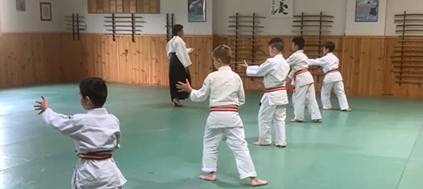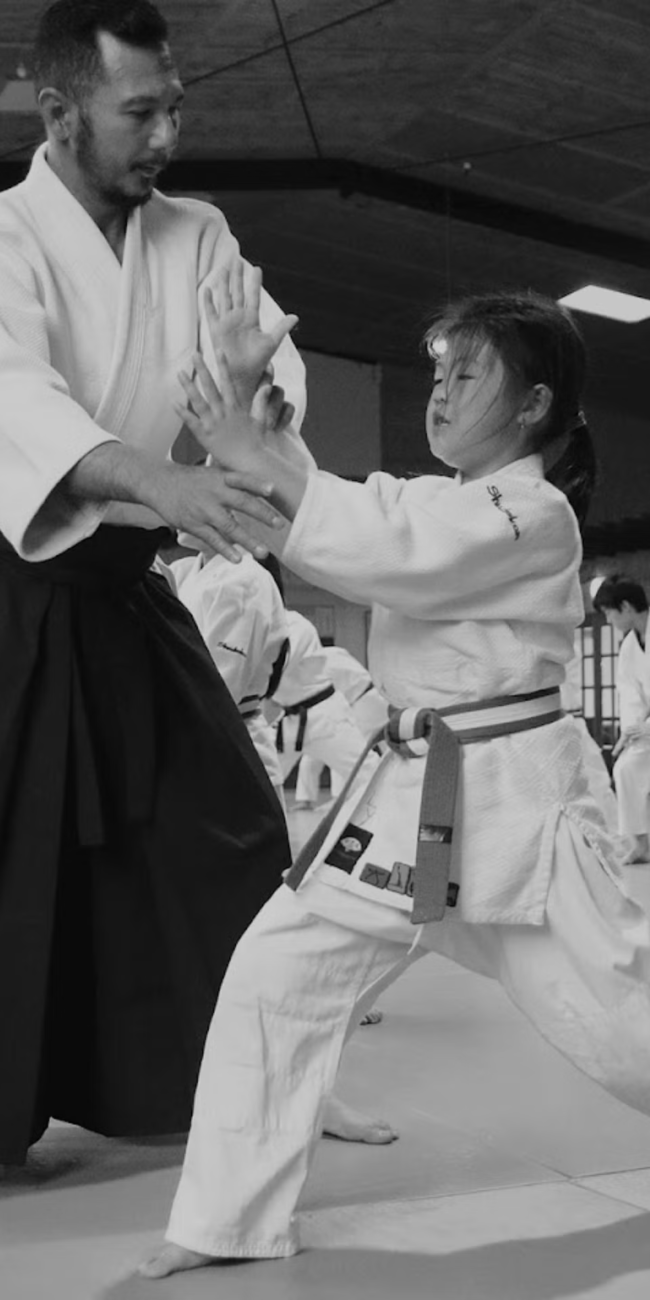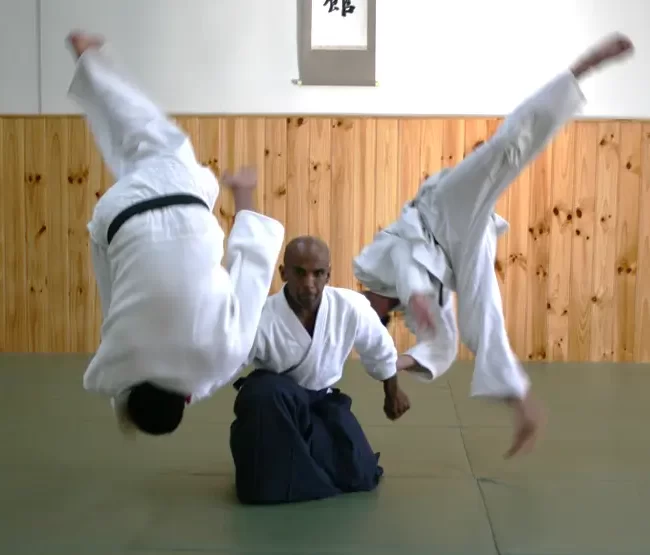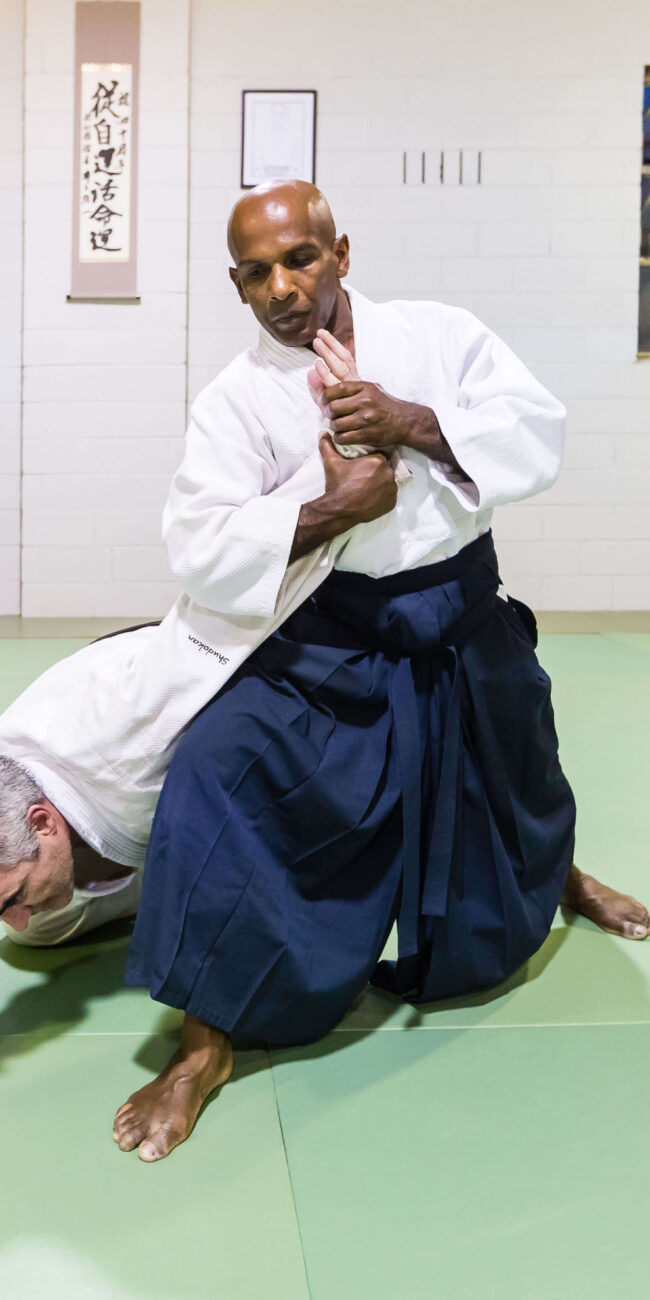
In the Heidelberg suburb of bustling Melbourne, amidst the chaos of daily life tucked away on a tree-lined street, stands a quaint traditional dojo known to many as Aikido Shudokan. Here, women of all ages and backgrounds gather to practice Aikido, a martial art renowned for its focus on harmony, fluidity, and self-defence. Among them was Mia, a young woman in her thirties, searching for a way to reclaim her sense of strength and confidence.
Mia had always been petite and soft-spoken, often feeling overlooked in a world dominated by louder voices and larger frames. One day, feeling a surge of determination, she stepped into Aikido Shudokan, her heart pounding with a mixture of excitement and apprehension.
Mia was greeted warmly by one of the 4 highly trained experienced Female Aikido Instructors at the Aikido Shudokan, her eyes twinkling with encouragement. All of the Female instructors at Aikido Shudokan are masterful Aikido practitioners, a testament to their power and grace that women could embody through this ancient traditional art.
As Mia attended her first class, she was captivated by the flowing movements and precise techniques demonstrated by her female instructors and fellow students. She marvelled at how effortlessly they redirected attacks and maintained their balance, relying not on brute strength but on skilful execution.
Weeks turned into months, months into years, and Mia diligently trained, soaking in the wisdom of Aikido. She learned about the importance of blending with an opponent’s energy, using circular motions to neutralize aggression, and maintaining a calm centre even in the face of adversity.
One evening, on her way home from the dojo, Mia encountered a troubling situation, a group of rowdy individuals harassing a fellow commuter. Normally, Mia would have hurried past, feeling powerless to intervene. But this time was different. Drawing on her Aikido training, she stepped forward with quiet confidence.
“Hey, leave her alone,” Mia said firmly, her voice surprisingly steady.
The group turned to face her; their expressions incredulous. One of them stepped forward, sizing her up with a smirk. “And who do you think you are?”
In that moment, Mia took a deep breath, channelling the spirit of Aikido. As the person lunged towards her, she gracefully sidestepped, using their own momentum to guide them past her. With a swift motion, she redirected their force, leading them to stumble and fall.
The sudden turn of events left the group bewildered, and they quickly dispersed, muttering curses under their breath. Mia stood there, her heart racing, realizing the profound impact that Aikido had on her sense of empowerment.
Back at Aikido Shudokan, Mia shared her experience with her Aikido Shudokan instructors and her fellow students. They nodded knowingly, understanding the transformative power of Aikido in women’s lives. Through Aikido, Mia had discovered not only self-defence skills but also a newfound inner strength, a strength that came from embracing her unique abilities and learning to navigate the world with grace and resilience.
In the gentle embrace of Aikido, Mia found a community where women uplifted and supported each other, a sanctuary where size and strength were secondary to wisdom and technique. With each practice, each encounter, Mia grew more confident, embodying the principles of harmony and empowerment that defined Aikido.
And so, in the heart of suburbia in bustling Melbourne, Mia stood tall, a testament to the transformative power of Aikido for women, a journey of self-discovery, empowerment, and the unwavering pursuit of harmony in a world yearning for balance.
Here are some underlying principles of Aikido and reasons why women have advantages in practicing it:
1. Non-aggression: Aikido emphasises non-aggression and the avoidance of conflict whenever possible. This philosophy is beneficial for both men and women, but women may find it especially more valuable in de-escalating potentially dangerous situations.
2. Blending and redirection: Aikido techniques involve blending with an opponent’s energy and redirecting it, rather than opposing it directly. This approach can be advantageous for women who may face physically stronger opponents, as it relies on leverage and timing rather than brute strength.
3. Minimal physical contact: Aikido techniques often require minimal physical contact with an opponent. This can be advantageous for women who want to defend themselves without necessarily having to engage in close physical combat.
4. Use of an opponent’s energy: Aikido practitioners learn to use an opponent’s energy and movements against them. Women can harness an assailant’s strength and aggression to neutralise threats without relying on their own physical strength.
5. Joint locks and pins: Aikido techniques include joint locks and pins that can be effective for controlling an opponent without causing lasting harm. This is particularly useful for self-defence scenarios where women may not want to inflict serious injury.
6. Empowerment and confidence: Practicing Aikido can boost self-confidence and a sense of empowerment in women. Learning effective self-defence techniques can give women the confidence to handle potentially dangerous situations.
7. Awareness and mindfulness: Aikido encourages practitioners to be mindful and aware of their surroundings. This heightened awareness can help women in recognising and avoiding potentially dangerous situations.
8. Self-defence focus: Aikido instructors often incorporate self-defence principles into their teachings, helping women learn practical techniques for real-life situations.
9. Equality and inclusivity: The underlying philosophy of Aikido promotes respect, harmony, and equality among all practitioners, regardless of gender. This inclusive and respectful environment can be beneficial for women training in martial arts.
10. Fostering Camaraderie and Support: Aikido self-defence classes often foster a sense of camaraderie and support among women. The shared experience of training together creates a supportive community where women can learn from one another, motivate each other, and develop lasting friendships. This community aspect is particularly important in empowering women, as it provides a safe space for them to express themselves freely and build strong bonds with like-minded individuals
FAQs
Q: Are Aikido self-defence classes suitable for women of all ages and fitness levels?
A: Yes, Aikido self-defence classes are designed to accommodate women of all ages and fitness levels. The techniques can be adapted to suit individual capabilities, ensuring that everyone can participate and benefit from the training.
Q: Will I need any prior martial arts experience to join Aikido self-defence classes?
A: No prior martial arts experience is necessary to join Aikido self-defence classes. The training is structured to gradually introduce beginners to the fundamental principles and techniques of Aikido, allowing them to progress at their own pace.
Q: Is Aikido suitable for women who are not physically strong?
A: Absolutely! Aikido techniques rely on using an opponent’s energy and movements against them, rather than relying on brute strength. This makes Aikido an ideal martial art for women who may not possess significant physical strength.
Q: What should I expect in an Aikido self-defence class?
A: In an Aikido self-defence class, you can expect a combination of warm-up exercises, technical instruction, partner practice, and meditation. The classes are typically conducted in a disciplined yet supportive atmosphere, with qualified instructors guiding students through the various techniques.
Aikido self-defence classes are offered at Aikido Shudokan across 3 locations in Melbourne (Heidelberg, Mulgrave and Research) to provide women with a unique opportunity to empower themselves through the practice of Aikido. By focusing on confidence-building, self-awareness, physical fitness, and community support, Aikido equips women with valuable skills that extend far beyond the training mat. Whether you are a beginner or an experienced practitioner, Aikido self-defence classes offer a transformative journey that enhances both physical and mental well-being.





